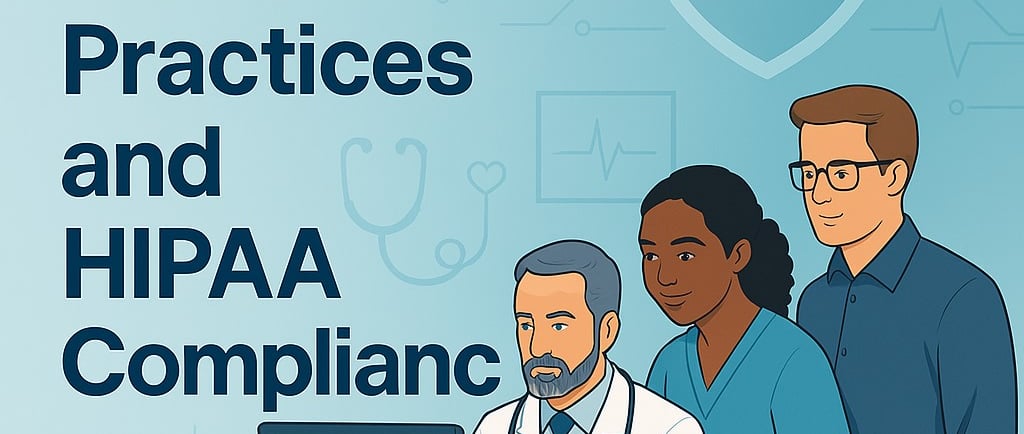Cyber One Information Technology "Your IT Partner For Growth and Success" Call 407-394-1000 to schedule a FREE BUSINESS EVALUATION
HIPAA Compliance and Cybersecurity: What Healthcare Providers Must Know
**HIPAA Compliance and Cybersecurity: What Healthcare Providers Must Know**
By Richard Medina, Certified Ethical Hacker
5/16/20253 min read


HIPAA Compliance and Cybersecurity: What Healthcare Providers Must Know
In today’s digital age, healthcare providers are under constant pressure to protect sensitive patient data while staying compliant with federal regulations. The Health Insurance Portability and Accountability Act (HIPAA) sets the standard for safeguarding Protected Health Information (PHI), but compliance alone is not enough to stop modern cyber threats.
If you're a healthcare provider, understanding the connection between HIPAA compliance and cybersecurity is critical—not just to avoid penalties, but to protect your patients, reputation, and business.
Here’s what you need to know.
What Is HIPAA and Why Does It Matter for Cybersecurity?
HIPAA is a federal law enacted in 1996 to protect patient health information. It includes rules around the privacy, security, and notification of data breaches involving PHI.
The HIPAA Security Rule, in particular, mandates that covered entities and their business associates must implement administrative, physical, and technical safeguards to ensure the confidentiality, integrity, and availability of electronic protected health information (ePHI).
Failure to comply with HIPAA can result in severe penalties—from tens of thousands to millions of dollars—and irreparable damage to your organization’s reputation.
Why HIPAA Compliance Alone Is Not Enough
Being HIPAA-compliant doesn't mean you're secure—it means you’ve met a minimum standard.
The threat landscape has evolved dramatically. Ransomware attacks, phishing campaigns, insider threats, and supply chain breaches are increasingly targeting small to mid-sized practices that assume they're too small to be on a hacker’s radar.
Without robust cybersecurity layered on top of HIPAA’s baseline requirements, healthcare organizations remain vulnerable.
Key Cybersecurity Practices for HIPAA Compliance
Here are the top cybersecurity practices every healthcare provider must implement to maintain HIPAA compliance and strengthen data security:
1. Risk Assessment (Required by HIPAA)
Conduct regular and thorough security risk assessments.
Identify vulnerabilities in your network, systems, and workflows.
Document and address any gaps in compliance or security posture.
Tip: Risk assessments should be updated annually—or whenever major system changes occur.
2. Access Controls & Authentication
Implement role-based access to limit PHI exposure.
Use strong, unique passwords and enforce regular password changes.
Require Multi-Factor Authentication (MFA) for remote access and critical systems.
3. Data Encryption
Encrypt ePHI both at rest and in transit to prevent unauthorized access.
Ensure backup data is encrypted as well.
4. Employee Training & Awareness
Train all staff on HIPAA regulations and cybersecurity best practices.
Conduct phishing simulations to improve awareness and response.
Emphasize the importance of reporting suspicious activity immediately.
5. Endpoint and Network Security
Use next-gen antivirus or Endpoint Detection & Response (EDR) tools.
Deploy firewalls, intrusion detection/prevention systems (IDS/IPS), and secure VPNs.
Regularly update and patch all software and operating systems.
6. Secure Mobile Devices and Remote Access
Enforce mobile device management (MDM) policies.
Ensure all remote work tools comply with HIPAA standards.
Avoid public Wi-Fi or require use of a secure, encrypted VPN.
7. Incident Response Plan
Have a documented plan for responding to a data breach or cyberattack.
Include procedures for containment, notification, investigation, and remediation.
Test your plan regularly with tabletop exercises.
Common Mistakes That Violate HIPAA (and Invite Hackers)
Storing ePHI on unencrypted devices
Sharing passwords or using weak login credentials
Not revoking access for former employees
Failing to regularly audit system access logs
Ignoring software update alerts or unsupported systems
HIPAA Breach Notification Rule: Know Your Obligation
If a breach occurs, HIPAA requires you to:
Notify affected individuals within 60 days
Report breaches affecting 500+ individuals to the HHS and local media
Maintain a log of smaller breaches to report annually
Failing to meet notification deadlines can result in civil penalties and further scrutiny from regulators.
Final Thoughts: Compliance Is a Starting Point—Not a Finish Line
Cybersecurity and HIPAA compliance go hand-in-hand, but they are not interchangeable. True protection requires proactive planning, ongoing training, and advanced technology to stay ahead of evolving threats.
At Cyber One, we specialize in helping healthcare providers secure their networks, train their staff, and stay HIPAA-compliant—all without the technical headaches. From risk assessments to 24/7 threat monitoring, we've got your back.
🛡️ Want a HIPAA cybersecurity checkup?
Contact us today to schedule a free consultation and see where your practice stands.
For more info visit www.CyberOneInfo.com
Contact Richard Medina, Certified Ethical Hacker https://www.linkedin.com/in/richme/
